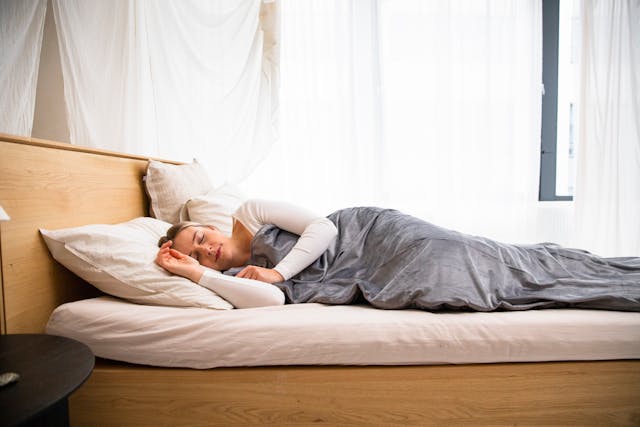Introduction
Technology has revolutionized the way we live, but it also comes with unintended consequences for our health. One area where its impact is particularly noticeable is in sleep. While technology has made life more convenient, it has also introduced several factors that can disrupt our sleep cycles and affect the quality of rest we get. Understanding how OneFramework can help manage and minimize these effects is crucial in maintaining healthy sleep habits. This article will explore 6 ways technology affects your sleep health and how you can mitigate its impact.
1. Blue Light Exposure and Sleep Disruption
One of the most well-known ways technology affects your sleep is through blue light exposure. Blue light is emitted from devices such as smartphones, tablets, and computers. This type of light can interfere with your body’s natural sleep-wake cycle, known as the circadian rhythm.
How Blue Light Affects Sleep:
- Suppression of Melatonin: Exposure to blue light inhibits melatonin production, the hormone responsible for regulating sleep. Without enough melatonin, it becomes harder to fall asleep, especially if you are exposed to screens late at night.
- Delaying Sleep Onset: The presence of blue light in the evening tricks the brain into thinking it’s still daytime, thus delaying sleep onset and reducing overall sleep quality.
Tips to Combat Blue Light Exposure:
- Use Blue Light Filters: Many devices offer blue light filters or “night mode” settings that reduce blue light emission.
- Limit Screen Time Before Bed: Aim to avoid screens at least 30 to 60 minutes before going to sleep.
- Use Blue Light Glasses: These glasses block blue light and can be worn during the day to reduce strain on your eyes and protect your sleep cycle.
2. Increased Screen Time and Mental Stimulation
Technology, particularly social media and entertainment, can lead to increased screen time before bed. The mental stimulation from engaging with screens can keep your brain active and make it difficult to unwind.
How Screen Time Affects Sleep:
- Cognitive Overload: Activities like browsing social media, watching TV, or playing video games engage the brain and can cause mental overstimulation, making it harder to relax and prepare for sleep.
- Impact on Sleep Quality: Even if you fall asleep after screen time, the quality of your sleep may be compromised. Your brain may remain more active, leading to restlessness and interrupted sleep health cycles.
Solutions for Better Sleep:
- Set a Screen Curfew: Limit your use of technology at least one hour before bedtime.
- Engage in Relaxing Activities: Instead of using devices, try reading a book, practicing deep breathing exercises, or listening to calming music before bed.
- Implement Bedtime Routines: Establish a regular bedtime routine that involves relaxing activities to signal to your brain that it’s time to wind down.
3. Sleep Tracking Technology and Sleep Anxiety
Sleep-tracking devices and apps have become increasingly popular, allowing individuals to monitor their sleep patterns. While these tools can provide useful data, they can also lead to anxiety about sleep quality, which may negatively affect sleep.
How Sleep Tracking Can Impact Sleep:
- Obsessing Over Sleep Data: Constantly checking your sleep data can create stress and worry, particularly if the results are not ideal. This anxiety can, in turn, make it harder to fall asleep.
- Sleep Performance Pressure: Some people may feel the need to achieve “perfect” sleep metrics, which leads to overthinking and further disruptions in their sleep routine.
Ways to Reduce Sleep Anxiety:
- Use Sleep Tracking Sparingly: While tracking can provide helpful insights, it’s important not to become obsessed with every detail.
- Focus on Overall Health: Rather than stressing over individual nights of sleep, focus on maintaining overall healthy sleep habits and a balanced lifestyle.
- Mindfulness Practices: Incorporating mindfulness and relaxation exercises can reduce the stress caused by sleep data and improve your overall sleep experience.
4. Noise Pollution and Sleep Disturbance
With the advent of smart home devices and constant connectivity, noise pollution has become a common problem for many. Whether it’s notifications from apps, alarms, or sounds from nearby devices, technology-induced noise can significantly disrupt your sleep Health.
How Noise Affects Sleep:
- Disruptive Sound Alerts: Smartphones, smart speakers, and wearables often send alerts and notifications throughout the night, disturbing sleep and causing frequent awakenings.
- Environmental Noise: Smart devices like thermostats, home assistants, and even televisions can contribute to background noise that makes it difficult to achieve restful sleep.
Solutions for Managing Noise:
- Silence Notifications: Set your phone and devices to “Do Not Disturb” mode during sleep hours to reduce interruptions.
- Use White Noise Machines: These devices can help mask disruptive noises in your environment, promoting better sleep.
- Create a Sleep-Friendly Environment: Ensure your bedroom is quiet and free from unnecessary devices or sounds. Consider using earplugs if needed.
5. Impact of Artificial Light on Sleep Quality
Artificial lighting, particularly from smart home systems, can affect your sleep health. Lighting affects our circadian rhythms, and exposure to bright or harsh lights before bed can disrupt your sleep cycle.
How Artificial Light Affects Sleep:
- Increased Alertness: Bright lights from devices or indoor lighting can trick your brain into staying alert, even when you need to wind down for the night.
- Reduced Sleep Duration: The disruption caused by artificial light exposure can delay sleep onset and lead to reduced sleep duration, making you feel fatigued the following day.
Solutions to Manage Artificial Light:
- Dim Lighting in the Evening: Use dim or warm lighting in the evening hours to signal to your brain that it’s time to wind down.
- Smart Lighting Systems: Some smart home systems allow you to adjust the lighting according to the time of day. Consider using warm, soft lights in the evening and brighter lights in the morning.
- Block Out Excess Light: Consider blackout curtains to ensure that external light doesn’t disrupt your sleep during the night.
6. Overuse of Technology and Reduced Physical Activity
Overuse of technology, particularly sedentary activities like watching TV or playing video games, can lead to a decrease in physical activity. A lack of physical exercise can, in turn, affect your sleep quality.
How Sedentary Lifestyles Affect Sleep:
- Physical Inactivity: Not moving enough throughout the day can lead to poor sleep quality. Exercise helps regulate your sleep-wake cycle and promotes deeper sleep.
- Increased Stress Levels: A lack of physical activity can lead to higher stress levels, which negatively impacts your ability to relax and fall asleep.
Solutions to Increase Physical Activity:
- Set Time for Physical Activity: Aim for at least 30 minutes of physical exercise each day. Walking, yoga, or light stretching can be great options.
- Take Breaks from Screen Time: Stand up, stretch, or take a quick walk every hour to reduce the negative effects of prolonged screen time.
- Incorporate Movement into Your Day: Try to add more movement into your daily routine, whether it’s using the stairs instead of the elevator or taking a walk after dinner.
Conclusion
Technology undeniably impacts our sleep health in numerous ways, from blue light exposure to mental stimulation and noise pollution. While technology brings many benefits to our daily lives, it’s important to recognize the negative effects it can have on our sleep. By implementing strategies such as limiting screen time before bed, reducing exposure to artificial light, and increasing physical activity, you can mitigate the adverse effects of technology on your sleep. Additionally, OneFramework provides tools and resources that can help you manage your technology usage and improve your overall sleep health. By taking proactive steps, you can achieve a better balance between technology and restful sleep.
Frequently Asked Questions
How does blue light affect my sleep?
Blue light from devices suppresses melatonin, making it harder to fall asleep. Using blue light filters or avoiding screens before bed can reduce its impact.
Can sleep tracking cause anxiety?
Yes, obsessing over sleep data can create stress and disrupt sleep. Use sleep trackers sparingly and focus on maintaining healthy sleep habits.
What is the best way to reduce noise during sleep?
You can reduce sleep disturbances by using the “Do Not Disturb” mode on devices and employing white noise machines or earplugs to mask external sounds.
How can I combat the effects of artificial light on my sleep?
Use dim, warm lighting in the evening, and avoid bright lights from devices. Smart lighting systems can adjust lighting to support your sleep routine.
Does technology contribute to physical inactivity?
Yes, excessive screen time can reduce physical activity. Make time for regular exercise to improve sleep quality and overall well-being.






